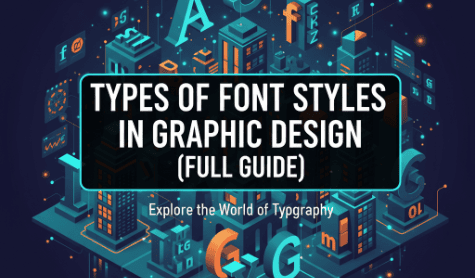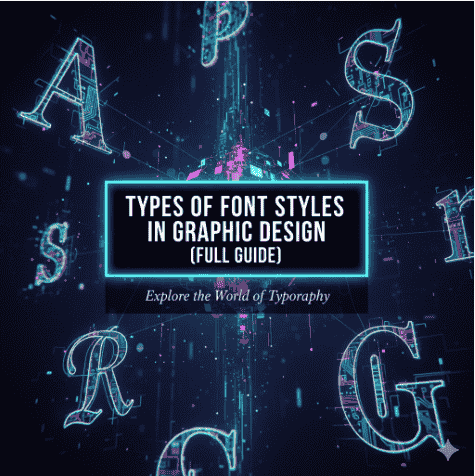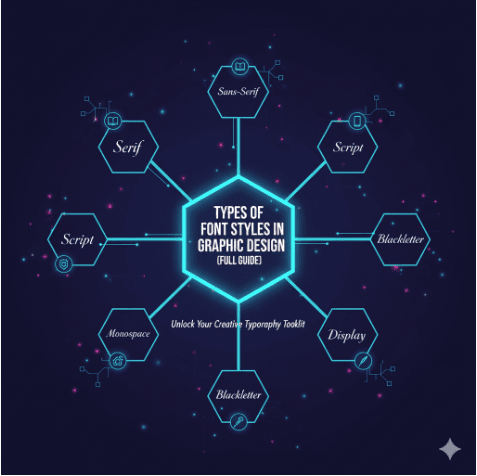
Table of Contents
- Introduction
- Why Font Styles Matter in Graphic Design
- The 5 Main Types of Font Styles
- 3.1 Serif Fonts
- 3.2 Sans Serif Fonts
- 3.3 Script Fonts
- 3.4 Display Fonts
- 3.5 Decorative Fonts
- How to Choose the Right Font for Your Design
- Examples of Professional Fonts You Can Use
- Conclusion
1. Introduction
Typography plays a crucial role in graphic design. Fonts are more than just letters; they convey mood, brand identity, and emotions. Choosing the right font can elevate your design and make it stand out. In this article, we’ll explore the types of font styles in graphic design, their unique characteristics, and how you can use them effectively in your projects.
2. Why Font Styles Matter in Graphic Design
Fonts influence how people perceive your message. A bold display font grabs attention, while a script font adds elegance. According to Adobe, typography directly impacts brand recognition and user experience. That’s why every designer should understand the different types of font styles and their applications.
Understanding different font styles in graphic design is essential for every designer.

3. The 5 Main Types of Font Styles
3.1 Serif Fonts
Serif fonts have small strokes or “feet” at the ends of letters. They are considered traditional, elegant, and trustworthy—perfect for branding, books, and professional documents.
Examples:
- Times New Roman
- Georgia
Explore a handcrafted serif option here: John Mike
3.2 Sans Serif Fonts
Sans serif fonts are clean and modern, with no extra strokes. They’re widely used in digital media and tech companies because they look minimal and easy to read.
Examples:
- Helvetica
- Arial
Check out our modern sans serif design: Faint Green Font
3.3 Script Fonts
Script fonts mimic handwriting or calligraphy, giving your design a personal and creative touch. They’re great for wedding invitations, branding, and artistic projects.
Examples:
- Brush Script
- Pacifico
Try our handcrafted script font: Hannalie Kaelani Font
3.4 Display Fonts
Display fonts are bold, decorative, and designed to grab attention. They’re ideal for headlines, posters, and logos.
Examples:
- Impact
- Bebas Neue
Unique option for display projects: Mode Center Font
3.5 Decorative Fonts
Decorative fonts push creativity to the extreme. They’re perfect for projects that require uniqueness and personality but should be used sparingly.
Examples:
- Jokerman
- Curlz MT
Add creativity to your design: Stick Note

4. How to Choose the Right Font for Your Design
When selecting a font, ask yourself:
- Who is my target audience?
- What emotions do I want to convey?
- Will this font be readable across different platforms?
Mixing and matching fonts can also create balance—using a serif for headlines and a sans serif for body text, for example.
5. Examples of Professional Fonts You Can Use
Here are some font families you can explore for your next design project:
- John Mike – Elegant serif for professional branding
- Faint Green Font – Strong sans serif with modern appeal
- Hannalie Kaelani Font – Expressive script style
- Mode Center Font – Playful display type
- Stick Note – Decorative touch for creative projects
6. Conclusion
Understanding the types of font styles in graphic design is essential for creating professional, engaging, and memorable visuals. Whether you choose serif for elegance, sans serif for clarity, or script for creativity, the right font can elevate your design.
Explore more premium handcrafted fonts at CalligraphyFonts.net to bring your next project to life.
